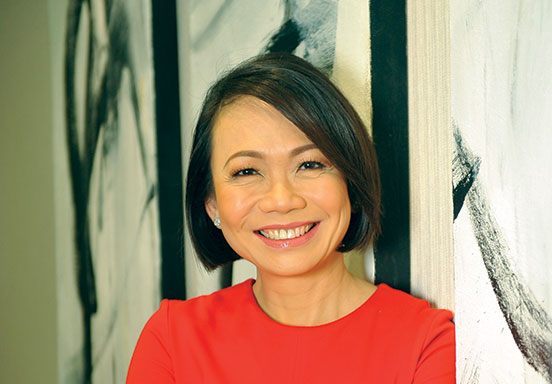Women of Influence
Rizalina Mantaring, M.S.’83
President and CEO, Sun Life Financial Philippines
Chair and President, Sun Life Foundation
“A Culture of Winning”
By Carol Olechowski

Photo credit: Dodie V. Legaspi
A company’s culture is perhaps its greatest asset, observes Rizalina Mantaring. “People change, technologies change, and the business environment changes. But if a company has a strong culture – one founded on integrity, excellence, continuous learning and genuine concern for people – it will be able to adapt more easily and stay ahead of the competition. I guess you can say it’s a culture of winning.”
Mantaring is determined to ensure that Sun Life maintains that culture. “In the Philippines, we operate several companies, primarily selling life insurance, mutual funds, and pension and education plans. We founded the life-insurance industry, starting operations in 1895, three years before the Republic of the Philippines was established.”
Shortly after Mantaring took over as CEO in 2009, Sun Life began preparing for its 120th anniversary by “developing a set of plans and strategies, collectively called Route 5.” Combining brand-building, marketing and the opening of a bancassurance channel – all things “we had never done” – with “the internal transformation of our advisers and staff,” Route 5 expanded the company’s new business “at a compound annual growth rate (CAGR) of 46 percent, well above our initial plan, between 2009 and 2013.” By 2011, Sun Life had become the Philippines’ largest life insurer, retaining its longtime No.-2 ranking in mutual funds.
Sun Life’s growth potential remains great. Mantaring notes: “The Philippines has a population of more than 100 million, with an average age of 22, a high literacy rate, and strong English-language skills. On gender equity, it is ninth overall on the World Economic Forum’s ranking of countries, outranking even the U.S. and Canada. Prosperity has been increasing, with GDP (gross domestic product) growth in the 5.5-to-7.5 percent range over the last few years. In 2015, the Philippines will enter the demographic sweet spot, with a large and increasingly prosperous working-age population, setting the stage for tremendous economic growth for the next two to three decades.”
Mantaring also heads the Sun Life Foundation, which has aided typhoon and earthquake victims; covered school costs for children; and “partnered with the Philippines’ Department of Education, the Red Cross and other organizations on various initiatives.” To celebrate Sun Life’s 120 years, “we have donated 120 boats to fishermen and are building 120 classrooms in the areas devastated by Typhoon Haiyan (Yolanda) in 2013; we have also sent 120 scholars to school. We’re quite proud of the work we have done. Sun Life is very much a part of the nation’s history.”
Her education provided Mantaring the skills essential for leading the foundation and a global business. After earning an undergraduate degree at the University of the Philippines, Diliman, she studied computer science at what was then SUNY Albany, “a popular choice for graduate school among the people I knew.” Living by herself in a foreign country taught Mantaring “to be truly independent,” while interacting with classmates from various countries and cultures “has helped me at Sun Life, where we work with colleagues from all over the world.”
She learned other lessons, as well. During study sessions, Mantaring says, “I thought I was helping by sharing solutions to the various problems we discussed “until a classmate told me, ’I don’t know why you bother to attend these sessions; you don’t need them.’ I realized then that, sometimes, you help best by letting people figure things out on their own.”
As a teaching assistant for Peter Bloniarz, then professor of computer science and “one of the best teachers I have ever had,” Mantaring would take only 20 minutes of the 30 allotted for discussing problem sets. “When Professor Bloniarz met all the TAs and asked if we had enough to discuss in our classes, he looked at me briefly and said nothing else, but he made me realize I had to figure out if I was actually delivering the expected results. I had to go above and beyond just doing a job.”



